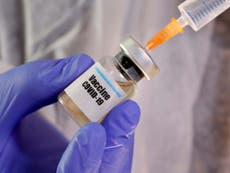Coronavirus: Surge in UK cases makes decision on Oxford vaccine more likely before end of year, says trial director
Phase three trial for vaccine candidate ‘going incredibly well’ and moving ‘at pace,’ says professor Andrew Pollard
Your support helps us to tell the story
From reproductive rights to climate change to Big Tech, The Independent is on the ground when the story is developing. Whether it's investigating the financials of Elon Musk's pro-Trump PAC or producing our latest documentary, 'The A Word', which shines a light on the American women fighting for reproductive rights, we know how important it is to parse out the facts from the messaging.
At such a critical moment in US history, we need reporters on the ground. Your donation allows us to keep sending journalists to speak to both sides of the story.
The Independent is trusted by Americans across the entire political spectrum. And unlike many other quality news outlets, we choose not to lock Americans out of our reporting and analysis with paywalls. We believe quality journalism should be available to everyone, paid for by those who can afford it.
Your support makes all the difference.The recent surge in coronavirus cases across the UK has made it more likely that researchers will be able to gather enough efficacy data for the Oxford University vaccine by the end of the year, a scientist leading the project has said.
Professor Andrew Pollard, director of the Oxford Vaccine Group, told a virtual conference that the phase three trial for the vaccine candidate was “going incredibly well” and moving “at pace”.
Once enough cases have been recorded among the programme’s 10,000 volunteers in the UK, scientists will then be able to ‘unblind the trial’ to see whether those infected with Covid-19 had been given a shot of AZD1222 or not.
These data, which will demonstrate the candidate’s efficaciousness, will then be presented to regulators to be approved, or rejected if there are questions over the findings.
Prof Pollard said it has “been relatively quiet since we started vaccinating” due to the national lockdown and subsequent suppression of cases within the community.
“But I think unfortunately from a public health point of view, we're seeing a big rise in cases at the moment as we approach the autumn months,” he said. “So we would anticipate seeing an accumulation of cases in the trial over the next few months.”
When asked at what point a vaccine would be made available for the public, Prof Pollard said: "The problem is that we're entirely at the mercy of the pandemic.
“So we have to accumulate enough cases in the trials for the regulators to be comfortable that when we try and look at the statistics of this difference between the two groups in the trials, that there is enough confidence … that the estimates we're giving are true.
“For that to occur we need to accumulate cases in the trials and of course that depends what happens next. We are just seeing this big rise in the UK and with 10,000 people we should be able to get there, potentially even this year.”
However, he warned that “we don’t know what the virus will do” or what strategy the UK government will adopt in trying to contain the spread, potentially making it “harder to evaluate the impact of the vaccine.”
Prof Pollard also said that “even if we had enough vaccine supply for everyone today”, there would still be “huge logistical challenges” involved in rolling out doses across populations.
“I think it's unlikely in my view that we're going to be very rapidly in a position where all social distancing measures can be dropped,” he said.
“Until we've got a high level of immunity in the population so that we can stop the virus in its tracks - either because we've blocked transmission or because the majority of people are immune - then until we reach that point, there is going to be a risk.
“I can’t give you a time scale but I don’t think it's going to be soon. Even if we've got a vaccine and we're rolling it out tomorrow, I don’t see well into next year that we could be in a position where we're comfortable to give up [the measures] and for everyone to be meeting in person.”
The Oxford candidate is one of 11 vaccines currently in the third and final stage of trials.
Earlier this month, the European Medicines Agency (EMA), the continent’s main health regulator for medical drugs, announced that it had started a rolling review of the Oxford vaccine.
This means that the EMA’s vaccine committee has begun evaluating the first batch of data on the candidate. This process of analysis will continue until sufficient data is available and a formal application is made.
“This does not mean that a conclusion can be reached yet on the vaccine’s safety and effectiveness, as much of the evidence is still to be submitted to the committee,” the watchdog said.
Trials for the vaccine were paused in September after a participant had a suspected adverse reaction in the UK.
AstraZeneca, which is manufacturing the vaccine on a global scale, described it as a "routine" pause in the case of "an unexplained illness". Trials in the UK have since resumed.
The UK has ordered 30 million doses of the vaccine, which is already being produced ahead of its expected approval.


Join our commenting forum
Join thought-provoking conversations, follow other Independent readers and see their replies
Comments